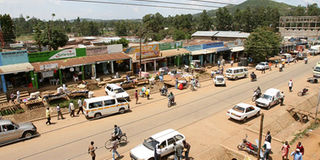Tanzanian herbalists cash in on Kenya doctors' strike

Migori town. Tanzanian herbalists have crossed the border into Kenya's Migori county to cash in on the on-going medical workers strike. PHOTO|FILE
What you need to know:
- Most of the herbalists came from Tanzania's Tarime District upon realising that all public hospitals in the Kenya had been shut following the strike that has entered its second week.
- Some of the herbalists claim to be using “majini” to detect hidden diseases and misfortunes one is confronted with.
Tanzanian herbalists have crossed the border into Kenya's Migori county to cash in on the on-going medical workers strike.
The “doctors” have set up make-shift clinics in Migori, Kehancha and at the Isebania border point where they claim to treat all manner of ailments.
Most of them came from Tanzania's Tarime district, upon realising that all public hospitals in the Kenya had been shut following the strike that has now entered its second week.
“We have come to help our brothers and sisters in Kenya. Our cost is not as high as that of private hospitals,” said Mr Rashid Mohammed, who claims to have been in the practice for 20 years.
He has set up his clinic in Nyasare estate within Migori Town where he said he attends to at least 20 patients daily.
Consultation fee is Sh100 but treatment varies from Sh500 to Sh10,000 depending on the nature of the disease one is suffering from.
Some of the herbalists claim to be using “majini” (spirits) to detect hidden diseases and misfortunes one is confronted with.
“My child was suffering from acute malaria and typhoid but after taking a porridge-like concoction, he is now feeling better,” said Mrs Elizabeth Anyango, a mother of six.
RESUME WORK
She appealed to the striking medical workers to resume work or be replaced by new people since many people could not afford the costs of private hospitals and the herbalists.
“A patient who has nothing in the pocket will simply die because even these Tanzanians are not treating people free of charge,” said Mrs Anyango.
The public medical workers from Migori County have kept away from health facilities despite pleas to have them resume duty.
Few in-patients who had remained at the Migori , Rongo, Awendo, Uriri, Nyatike, Kuria West and Kuria East Districts hospitals were evacuated by their relatives, with others being taken to private hospitals while some were taken to herbalists for treatment.
Others who could not afford the cost of private hospitals or herbalists, were returned home “to wait for their destiny with God”.
Stung by suffering of the patients, Migori Governor Okoth Obado told the striking medical workers to resume work immediately to allow space for negotiations.
He said the medical workers had “no genuine cause to down tools”.
No governor has been petitioned by the workers on areas they want improved, he argued.
Mr Obado told the Nation since county governments were the employers of the medical workers, they needed to engage governors first on their demands before going on strike.
“And their desire to revert to national government can only be effected through referendum and not through strike since the devolution of the health sector is anchored in the constitution,” he said.
Mr Obado said it was “sad that poor Kenyans were dying as a result of the on-going strike by the public medical workers”.




